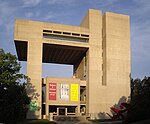Cornell West Campus

West Campus is a residential section of Cornell University's Ithaca, New York campus. As defined by the 2008 Master Plan, it is bounded roughly by Fall Creek gorge to the north, West Avenue and Libe Slope to the east, Cascadilla gorge and the Ithaca City Cemetery to the south, and University Avenue and Lake Street to the west. It now primarily houses transfer students, second year students, and upperclassmen. The university's Division of Student and Campus Life (SCL) uses the term differently, to refer to those buildings which are part of the West Campus House System, which organizes residents into five residential colleges. SCL labels its traditional dormitories and other residences on West Campus and in Collegetown collectively as "South Campus."
Excerpt from the Wikipedia article Cornell West Campus (License: CC BY-SA 3.0, Authors, Images).Cornell West Campus
West Avenue, City of Ithaca
Geographical coordinates (GPS) Address Nearby Places Show on map
Geographical coordinates (GPS)
| Latitude | Longitude |
|---|---|
| N 42.447222222222 ° | E -76.489444444444 ° |
Address
Hans Bethe House
West Avenue 314
14850 City of Ithaca (Ward 4)
New York, United States
Open on Google Maps











